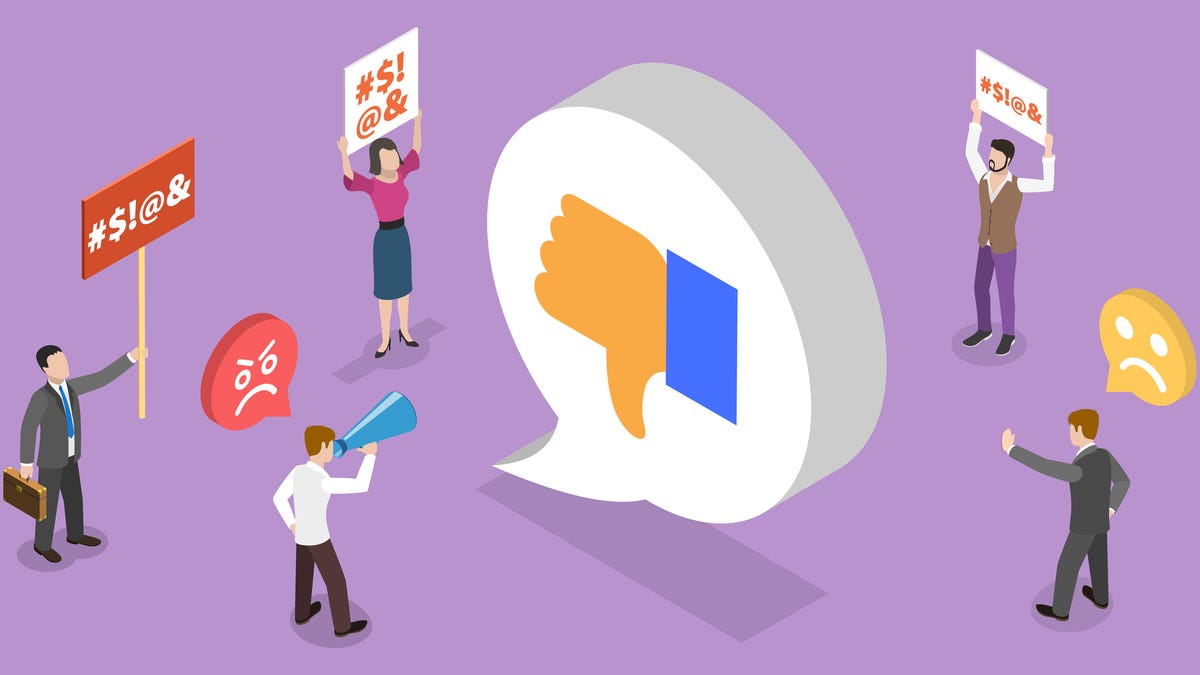Social Media Should Censor Itself, Without Government Intervention, Most Americans Say
New polling from the firm Ipsos finds that most Americans worry about bad behavior on social media, and want companies to act.

Bad behavior seems pervasive on the internet. Americans want Big Tech to deal with it.
Social media is getting under our skin, and new polling data shows that Americans want tech companies to fix it.
Surveys released by polling firm Ipsos on Monday show that a majority of Americans support content moderation on social networks, including putting warning labels on misinformation, deleting incitements to violence and suspending or banning offending accounts. Only 19% of Americans believe tech companies should do nothing and allow incitements to violence to be posted. Even fewer people, just 17%, believe social media companies should do nothing and allow posts containing misinformation or bullying.
"Basically, public opinion is giving license to tech companies to curate themselves," said Cliff Young, president of US Public Affairs at Ipsos. He added that another Ipsos poll found that Americans don't support government intervention with social media content. "What we see across the board is support for self-action" by tech companies, he said.
More than half of Americans support social media companies acting against bad behavior.
The Ipsos data, based on about 200 questions asked in eight polls over the past year and made available to the wider public Monday, offers an unusually clear indication of what Americans want social media companies to do about bad behavior on their platforms.
For much of the last decade, politicians, tech executives and people using the internet have argued about how much social media companies like Facebook, Twitter, Google's YouTube and TikTok should moderate their platforms. Companies that track hate groups say the companies aren't aggressively pulling down enough posts, while many politicians, including former President Donald Trump, say tech companies have gone too far.
In some cases, conservative politicians, including Florida Gov. Ron DeSantis and Texas Gov. Greg Abbott, have signed new laws aimed at punishing social media companies for "wrongful censorship" on their platforms. Though many of those efforts have struggled amid constitutional arguments in the courts, some of the loudest voices in American politics have made clear they believe big tech companies shouldn't moderate potentially hateful, bullying or incendiary political speech.
Polling shows that many Americans agree on most policy proposals around big tech, including antitrust, right to repair and net neutrality.
Shortly after the US Capitol riots on Jan. 6 last year, tech companies including Twitter, Facebook and YouTube removed Trump and some of his most vocal advocates from their platforms. They cited concerns that Trump's months long campaign of bullying, threats and lies about his election loss had sparked the carnage that left five people dead, including a Capitol Police officer. Trump has since released many statements denying his culpability, arguing instead that tech companies had acted wrongly. Trump's actions related to the Jan. 6 riot led to his second impeachment by the US House of Representatives, and they're a focal point for a bipartisan congressional commission investigating the event.
Young, at Ipsos, said the Capitol riots were a key moment when many Americans began to reexamine social media's role in their lives.
Indeed, older polls from the Pew Research Center showed that before the 2020 election and 2021 riot, Americans were much more split about how to treat tech. A 2019 study by Pew found that 77% of Democrats thought social media companies "have a responsibility to remove offensive content from their platforms." By comparison, about 52% of Republicans had the same view back then.
Fast-forward to 2021, when Ipsos polling performed in the months after the Capitol riots indicated that more Americans in both parties want tech companies to curb bad behavior online. "This was an inflection point for decision makers wanting to better understand the relationship between society and tech," Young said.
A mob of people carrying Trump flags attacked the Capitol on Jan. 6, 2021, erecting a hangman's noose, beating police officers and threatening lawmakers.
Nuanced but similar views
Tech companies are among the most profitable, most valuable and most powerful businesses in the world. They're also front of mind for many Americans, who rate disinformation, conspiracy theories, social media-driven radicalization and hacking above other big issues, like racism and the climate crisis. More than 79% of respondents to one Ipsos poll, in September, said they were concerned with at least one of those tech issues, roughly tying with "crime and public safety" and "the economy and jobs."
Ipsos data also found that Republicans, Democrats and independents largely agreed on the importance of these issues, with hacking, malware and data breaches scoring among the top three concerns from all three groups.
Additionally, Ipsos surveys found that Americans largely understand the difference between social media companies and other tech giants, with 88% saying search engines and the ability to find things on the internet improved their lives, while only 45% felt the same about social media. When discussing specific companies, respondents saying they're Republican or independent overall had a negative view of Facebook and Twitter, while less than 15% of Democrats viewed either company favorably. Google, Amazon, Microsoft and Apple were all viewed more favorably, Ipsos data showed.

